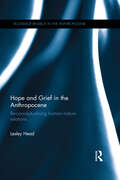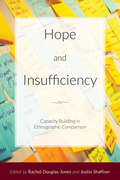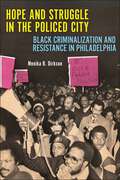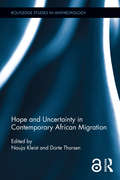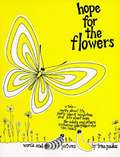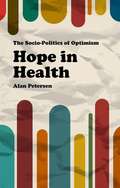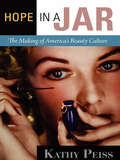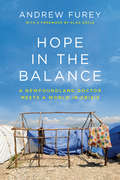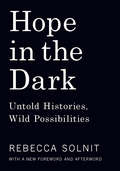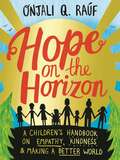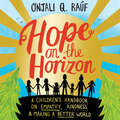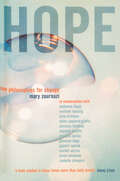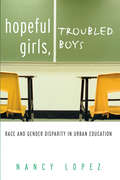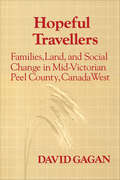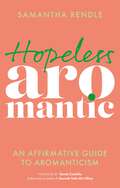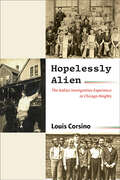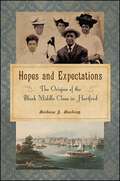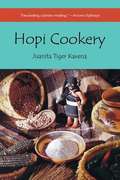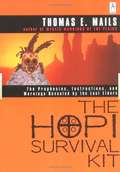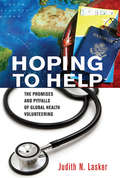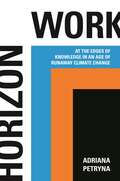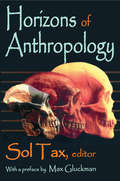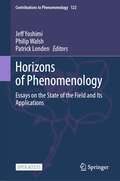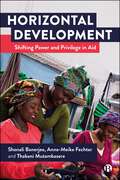- Table View
- List View
Hope and Grief in the Anthropocene: Re-conceptualising human–nature relations (Routledge Research in the Anthropocene)
by Lesley HeadThe Anthropocene is a volatile and potentially catastrophic age demanding new ways of thinking about relations between humans and the nonhuman world. This book explores how responses to environmental challenges are hampered by a grief for a pristine and certain past, rather than considering the scale of the necessary socioeconomic change for a 'future' world. Conceptualisations of human-nature relations must recognise both human power and its embeddedness within material relations. Hope is a risky and complex process of possibility that carries painful emotions; it is something to be practised rather than felt. As centralised governmental solutions regarding climate change appear insufficient, intellectual and practical resources can be derived from everyday understandings and practices. Empirical examples from rural and urban contexts and with diverse research participants - indigenous communities, climate scientists, weed managers, suburban householders - help us to consider capacity, vulnerability and hope in new ways.
Hope and Insufficiency: Capacity Building in Ethnographic Comparison
by Rachel Douglas-Jones Justin ShaffnerA process through which skills, knowledge, and resources are expanded, capacity building, remains a tantalizing and pervasive concept throughout the field of anthropology, though it has received little in the way of critical analysis. By exploring the concept’s role in a variety of different settings including government lexicons, religious organizations, environmental campaigns, biomedical training, and fieldwork from around the globe, Hope and Insufficiency seeks to question the histories, assumptions, intentions, and enactments that have led to the ubiquity of capacity building, thereby developing a much-needed critical purchase on its persuasive power.
Hope and Struggle in the Policed City: Black Criminalization and Resistance in Philadelphia
by Menika B. DirksonExplores how concerns about poverty-induced Black crime cultivated by police, journalists, and city officials sparked a rise in tough-on-crime policing in PhiladelphiaDuring the Great Migration of African Americans to the North, Philadelphia’s police department, journalists, and city officials used news media to create and reinforce narratives that criminalized Black people and led to police brutality, segregation, and other dehumanizing consequences for Black communities. Over time, city officials developed a system of racial capitalism in which City Council financially divested from social welfare programs and instead invested in the police department, promoting a “tough on crime” policing program that generated wealth for Philadelphia’s tax base in an attempt to halt white flight from the city.Drawing from newspapers, census records, oral histories, interviews, police investigation reports, housing project pamphlets, maps, and more, Hope and Struggle in the Policed City draws the connective line between the racial bias African Americans faced as they sought opportunity in the North and the over-policing of their communities, of which the effects are still visible today. Menika B. Dirkson posits that the tough-on-crime framework of this time embedded itself within every aspect of society, leading to enduring systemic issues of hyper-surveillance, the use of excessive force, and mass incarceration.Hope and Struggle in the Policed City makes important contributions to our understanding of how a city government’s budgetary strategy can function as racial capitalism that relies on criminal scapegoating. Most cogently, it illustrates how this perpetuates the cycle of poverty-induced crime, inflates rates of incarceration and police brutality, and marginalizes poor people of color.
Hope and Uncertainty in Contemporary African Migration (Routledge Studies in Anthropology)
by Nauja Kleist Dorte ThorsenThis volume examines the relationship between hope, mobility, and immobility in African migration. Through case studies set within and beyond the continent, it demonstrates that hope offers a unique prism for analyzing the social imaginaries and aspirations which underpin migration in situations of uncertainty, deepening inequality, and delimited access to global circuits of legal mobility. The volume takes departure in a mobility paradox that characterizes contemporary migration. Whereas people all over the world are exposed to widening sets of meaning of the good life elsewhere, an increasing number of people in the Global South have little or no access to authorized modes of international migration. This book examines how African migrants respond to this situation. Focusing on hope, it explores migrants’ temporal and spatial horizons of expectation and possibility and how these horizons link to mobility practices. Such analysis is pertinent as precarious life conditions and increasingly restrictive regimes of mobility characterize the lives of many Africans, while migration continues to constitute important livelihood strategies and to be seen as pathways of improvement. Whereas involuntary immobility is one consequence, another is the emergence and consolidation of new destinations emerging in the Global South. The volume examines this development through empirically grounded and theoretically rich case studies in migrants’ countries of origin, zones of transit, and in new and established destinations in Europe, North America, the Middle East, Latin America and China. It thereby offers an original perspective on linkages between migration, hope, and immobility, ranging from migration aspirations to return.
Hope for the Flowers
by Trina PaulusA modern-day fable that has given hope and inspiration to millions.
Hope in Health
by Alan PetersenThe language of hope permeates contemporary health and healthcare. It is believed that patients who are hopeful are more likely to recover, and health professionals endeavour to 'instil' or 'manage' hope in patients. The rhetoric of hope is extensively employed in marketing medical tests, treatments and devices. Despite this focus on hope in health, sociologists and other social scientists have failed to offer a systematic analysis of the discourses of hope and related practices. This book is the first to explore the socio-politics of hope in the contexts of health and healthcare. It highlights the significance of technological promise in contemporary conceptions of hope, making reference to examples such as stem cell treatments, medical testing, personal risk management, the use of self-tracking devices, and anti-ageing treatments and longevity research. The book concludes by arguing for scholars to take more seriously the significance of 'hope' in the contexts of health and healthcare.
Hope in a Jar
by Kathy PeissHow did powder and paint, once scorned as immoral, become indispensable to millions of respectable women? How did a "kitchen physic," as homemade cosmetics were once called, become a multibillion-dollar industry? And how did men finally take over that rarest of institutions, a woman's business?In Hope in a Jar, historian Kathy Peiss gives us the first full-scale social history of America's beauty culture, from the buttermilk and rice powder recommended by Victorian recipe books to the mass-produced products of our contemporary consumer age. She shows how women, far from being pawns and victims, used makeup to declare their freedom, identity, and sexual allure as they flocked to enter public life. And she highlights the leading role of white and black women--Helena Rubenstein and Annie Turnbo Malone, Elizabeth Arden and Madame C. J. Walker--in shaping a unique industry that relied less on advertising than on women's customs of visiting and conversation. Replete with the voices and experiences of ordinary women, Hope in a Jar is a richly textured account of the ways women created the cosmetics industry and cosmetics created the modern woman.
Hope in the Balance: A Newfoundland Doctor Meets a World in Crisis
by Andrew FureyDr. Andrew Furey, an orthopedic surgeon, was sitting by the fireplace at his home in St John's, Newfoundland and Labrador, watching TV after work, when dreadful images of the aftermath of an earthquake in Haiti burst in on the cosy domestic scene. Human suffering on an epic scale was being documented in real time. Dr. Furey spent a sleepless night, and woke knowing he had to help in some way. In what has been a theme throughout Newfoundland and Labrador's history, he found himself answering the call. Dr. Furey formed a team of three--himself; his wife and pediatric emergency room physician, Dr. Allison Furey; and orthopedic surgeon Will Moores--and together they travelled from to Port-au-Prince, Haiti, where they spent a week volunteering. The challenge seemed overwhelming: a multitude of badly injured victims, horrendous working conditions and overstretched aid agencies. But somehow the trio did not lose hope. Instead, they redoubled their efforts. After returning from that first mission, Dr. Furey founded Team Broken Earth--an expert, unbureaucratic, fleet-footed volunteer task force of physicians, nurses and physiotherapists committed to providing aid in Haiti. The organization has continued to grow, recruiting volunteers from all over Canada. It has carried out many more missions to Port-au-Prince and has expanded its operations to other countries like Bangladesh, Guatemala, Ethiopia and Nicaragua. And its mission has expanded in other ways, with education and training for local medical professionals now at the heart of its endeavour. Dr. Andrew Furey tells the story of Team Broken Earth's founding and remarkable work with vivid immediacy and raw honesty. He shares his doubts and failures and moments of near-despair. He explores how his Newfoundland and Labrador upbringing has informed his efforts abroad. And he reaches an optimistic conclusion that will leave readers inspired to bring about positive change in their own lives.
Hope in the Dark: Untold Histories, Wild Possibilities (Canons Ser. #51)
by Rebecca SolnitUntold Histories, Wild Possibilities
Hope on the Horizon: A children's handbook on empathy, kindness and making a better world
by Onjali Q. Rauf"No one is too small to make a change."Growing up, there is so much out of our control and so much we can feel helpless about. But together, we can make a difference. In this inspiring and practical handbook, bestselling children's author and Human Rights campaigner, Onjali Raúf, shares her top ten ways for creating change.With the help of her favourite fictional characters and some of the most inspiring people she has ever met, Onjali invites readers to dive in and discover everything there is to know about kindness, empathy, friendship and fighting for the things that matter. (Plus cool stuff like X-ray vision and deflecting negative forces.)Because with a bit of compassion, a big dollop of hope and even the smallest act of kindness, we can all make the world a better place. Hope is on the horizon; you just have to find it.Parental guidance recommended: issues related to discrimination, injustice and prejudice are included.
Hope on the Horizon: A children's handbook on empathy, kindness and making a better world
by Onjali Q. RaúfNo one is too small to make a change.Growing up, there is so much out of our control and to feel frustrated about. But in this inspiring and practical handbook, bestselling children's author and Human Rights campaigner, Onjali Raúf, shares her top ten ways for finding hope, creating change and making a difference.With the help of her favourite fictional characters and some of the most inspiring people she has ever met, Onjali invites readers to dive in and discover everything there is to know about kindness, empathy, friendship and fighting for the things that matter. (Plus, cool stuff like X-ray vision and detecting negative forces. Yes!)Because with a bit of compassion, a big dollop of hope and even the smallest act of kindness, magical things can happen. Hope is on the horizon; here's how children everywhere can find it.Parental guidance recommended: issues related to discrimination, injustice and prejudice are included.
Hope: New Philosophies for Change
by Mary ZournaziHow is hope to be found amid the ethical and political dilemmas of modern life? Writer and philosopher Mary Zournazi brought her questions to some of the most thoughtful intellectuals at work today. She discusses joyful revolt with Julia Kristeva, the idea of the rest of the world with Gayatri Spivak, the art of living with Michel Serres, the carnival of the senses with Michael Taussig, the relation of hope to passion and to politics with Chantal Mouffe and Ernesto Laclau. A dozen stimulating minds weigh in with their visions of a better social and political order. The result is a collaboration - of writing, of thinking, and of politics - that demonstrates more clearly than any single-authored project could how ideas encountering one another can produce the vision needed for social change.
Hopeful Girls, Troubled Boys: Race and Gender Disparity in Urban Education
by Nancy LopezThis book is an ethnographic study of Carribean youth in New York City to help explain how and why schools and cities are failing boys of color.
Hopeful Travellers: Families, Land, and Social Change in Mid-Victorian Peel County, Canada West
by David GaganIn this exploration of the nature of social reality in a mid-nineteenth-century Upper Canadian farming community, Professor Gagan employs the techniques of historical demography to reconstruct the population of mid-Victorian Peel County – specifically the histories of those families who occupied the county between 1845 and 1875. The evidence will be familiar to anyone who has tried to trace nineteenth-century Canadian family roots, but in this analysis the material is used to answer a broad range of questions related to the central problems of land availability and social change. The author argues that in Peel County, as in the rest of Upper Canada, immigration, settlement, and population growth rapidly changed the previously agrarian frontiers of cheap and abundant farm land into mature agricultural communities. Patterns of inheritance, the timing of family formation, the size and structure of families, the life-cycle experiences of men, women, and children, chances for social betterment, and patterns of vocational and geographical mobility were all linked to the problem of land availability and all underwent subtle changes as rural society attempted to adjust to the new realities of life in the clearings. This book is both s significant contribution to the social history of Ontario and to the growing corpus of comparative, international scholarship on the history of the family.
Hopeless Aromantic: An Affirmative Guide to Aromanticism
by Samantha RendleIf you've picked up this book, the chances are you have some doubts about your Happiness 101 assignment sheet. True love; candlelit dinners; 2.1 children; joint bank accounts - The One? It might make you want to a run a mile - or you might just have a few big questions. Aromanticism is defined as experiencing little to no romantic attraction to others. Sam Rendle, onetime aromantic asexual, sometime aroaceflux, and present-day label unspecified, knows a thing or two about the aro spectrum - and she has some answers for you.You'll explore what aromanticism is, how aromantic people form relationships, how to know if you're aromantic and deal with internalised shame and societal stigma. With a history of aromantic representation, guidance on queerplatonic relationships, and testimony from your worldwide aro family - this is the affirmatory aro companion to have in your back pocket.
Hopelessly Alien: The Italian Immigration Experience in Chicago Heights (SUNY series in Italian/American Culture)
by Louis CorsinoHopelessly Alien is an in-depth study of Italian immigration to Chicago Heights, Illinois, between 1910 and 1950. Drawing upon oral histories, interviews, historical documents, and census materials, Louis Corsino examines the critical concept of hope, which most immigration studies have cast in privatized, psychological terms as the motivation to emigrate in search of a better life. This investigation offers a more contentious, sociological perspective, depicting hope as both an ideological lure to recruit and manage the "foreign element" and as a resource immigrants employed to purchase acceptance and avoid a disparaging label as a "hopelessly alien" stranger. These dialectical processes are illustrated through the Italian immigrants' pursuit of occupational mobility and homeownership, and the appropriation of their children's hopes. Each became forms of cultural capital that demonstrated a public commitment to the American ethos of "joyful striving." Each provided measures of success, but these individual pursuits came at the expense of upsetting the necessary tension between individual and communal hopes.
Hopes and Expectations: The Origins of the Black Middle Class in Hartford
by Barbara J. BeechingWinner of the 2017 Homer D. Babbidge Jr. Award presented by the Association for the Study of Connecticut HistoryBased on a treasure trove of more than two hundred personal letters written in the 1860s, Hopes and Expectations tells the story of three young African Americans in the North. Living on Maryland's eastern shore, schoolteacher Rebecca Primus sent "home weeklies" to her parents in Hartford and also corresponded with friend Addie Brown, a domestic worker back home. Addie wrote voluminously to Rebecca, lamenting their separation and describing her struggle to achieve a semblance of security and stability. Around the same time, Rebecca's brother, Nelson, began writing home about his new life in Boston, as he set out to make a name and a career for himself as an artist. The letters describe their daily lives and touch on race, class, gender, religion, and politics, offering rare entry into individual black lives at that time.Through extensive archival research, Barbara J. Beeching also shows how the story of the Primus family intersects with changes over time in Hartford's black community and the country. Newspapers and census tracts, as well as probate, land, court, and vital records help her trace an arc of local black fortunes between 1830 and 1880. Seeking full equality, blacks sought refinement and respectability through home ownership, literacy, and social gains. One of the many paradoxes Beeching uncovers is that just as the Civil War was tearing the nation apart, a recognizable black middle class was emerging in Hartford. It is a story of individuals, family, and community, of expectation and disappointment, loss and endurance, change and continuity.
Hopi Cookery
by Juanita Tiger KavenaMore than one hundred authentic recipes center around Hopi staples of beans, corn, wheat, chilies, meat, gourds, and native greens and fruits.
Hopi Survival Kit, The
by Thomas E. MailsThe Elders of Hotevilla, a remote Hopi reservation in Arizona, are the last of a long line of traditionalists, keepers of a remarkable covenant dating back to 1100 that was created to ensure the well-being of the Earth and its creatures. "The Hopi Survival Kit" preserves the teachings of the Elders and brings them to the world precisely at a time when they are most needed.
Hoping to Help: The Promises and Pitfalls of Global Health Volunteering
by Judith N. LaskerOverseas volunteering has exploded in numbers and interest in the last couple of decades. Every year, hundreds of thousands of people travel from wealthier to poorer countries to participate in short-term volunteer programs focused on health services. Churches, universities, nonprofit service organizations, profit-making "voluntourism" companies, hospitals, and large corporations all sponsor brief missions. Hoping to Help is the first book to offer a comprehensive assessment of global health volunteering, based on research into how it currently operates, its benefits and drawbacks, and how it might be organized to contribute most effectively. Given the enormous human and economic investment in these activities, it is essential to know more about them and to understand the advantages and disadvantages for host communities.Most people assume that poor communities benefit from the goodwill and skills of the volunteers. Volunteer trips are widely advertised as a means to "give back" and "make a difference." In contrast, some claim that health volunteering is a new form of colonialism, designed to benefit the volunteers more than the host communities. Others focus on unethical practices and potential harm to the presumed "beneficiaries." Judith N. Lasker evaluates these opposing positions and relies on extensive research--interviews with host country staff members, sponsor organization leaders, and volunteers, a national survey of sponsors, and participant observation--to identify best and worst practices. She adds to the debate a focus on the benefits to the sponsoring organizations, benefits that can contribute to practices that are inconsistent with what host country staff identify as most likely to be useful for them and even with what may enhance the experience for volunteers. Hoping to Help illuminates the activities and goals of sponsoring organizations and compares dominant practices to the preferences of host country staff and to nine principles for most effective volunteer trips.
Horizon Work: At the Edges of Knowledge in an Age of Runaway Climate Change
by Adriana PetrynaA new way of thinking about the climate crisis as an exercise in delimiting knowable, and habitable, worldsAs carbon dioxide emissions continue to rise, Earth’s fragile ecosystems are growing increasingly unstable and unpredictable. Horizon Work explores how climate change is disrupting our fundamental ability to project how the environment will act over time, and how these rapidly faltering predictions are colliding with the dangerous new realities of emergency response.Anthropologist Adriana Petryna examines the climate crisis through the lens of “horizoning,” a mode of reckoning that considers unnatural disasters against a horizon of expectation in which people and societies can act. She talks to wildfire scientists who, amid chaotic fire seasons and shifting fire behaviors, are revising predictive models calibrated to conditions that no longer exist. Petryna tells the stories of wildland firefighters who could once rely on memory of previous fires to gauge the behaviors of the next. Trust in patterns has become an occupational hazard. Sometimes, the very concept of projection becomes untenable. Yet if all we see is doom, we will overlook something crucial about the scientific and ethical labor needed to hold back climate chaos. Here is where the work of horizoning begins.From experiments probing our planetary points of no return to disaster ecologies where the stark realities of climate change are being confronted, Horizon Work reveals how this new way of thinking has the power to reverse harmful legacies while turning voids where projection falters into spaces of collective action and recoverable futures.
Horizons of Anthropology
by Sol TaxThe scientific study of human evolution and culture is about a hundred years old. This volume surveys its achievements and methods. Originally published more than forty years ago, the volume's contributors include people who have shaped anthropology's future. As Gluckman says in his Preface, the contributions "point to the horizons of increasing understanding of man, his evolution and his social setting, as seen by a rising generation of scholars."The book includes chapters on how man gradually became different from other primates--on the origin and nature of language and its contribution to our peculiarities as human beings. It surveys the long history of human culture and societies and the theories about their similarities and differences; it discusses human equality and inequality, and it considers, from the anthropologist's point of view, economics, politics, law, religion, medicine, and the arts.In recent decades the various branches of anthropology--physical, cultural, psychological, and social--have become more specialized, and each branch is increasingly linking itself to its appropriate cognate, biological, psychological, or social sciences. Yet there remains a central common field to anthropology, as the science of man, for practitioners in all its branches. This book develops that common interest and deals with the specific problems of various parts of the field. The book brings out the basic nature of anthropology and the extraordinary fascination that lies in the systematic study of the exuberant variety of human societies and customs.
Horizons of Phenomenology: Essays on the State of the Field and Its Applications (Contributions to Phenomenology #122)
by Philip Walsh Jeff Yoshimi Patrick LondenThis is an open access book which explores phenomenology as both an exceptionally diverse movement in philosophy as well as an active research method that crosses disciplinary boundaries. The volume brings together lively overviews of major areas and schools of phenomenology, as well as the most recent applications across a range of fields. The first part reviews the state-of-the-art in various areas of contemporary phenomenology, including several distinct schools of Husserl and Heidegger scholarship, as well as approaches derived from Merleau-Ponty, de Beauvoir, Fanon, and others. An innovative quantitative analysis of citation networks provides rich visualizations of the field as a whole. The second part showcases phenomenology as a living discipline that can advance research in other areas. While some areas of interaction between phenomenology and other disciplines are by now well established (e.g. cognitive science), this volume sheds light on newer areas of application. The goal is to move beyond discussions of philosophical method and highlight scholars who are actually doing phenomenology in a variety of areas, including: Embodiment and questions of gender, race, and identity, The arts (visual art, literature, architecture), and Archaeology and anthropology. This volume offers a concise introduction to cutting edge phenomenological research and is suitable for both students and specialists.
Horizons: The World
by Houghton Mifflin HarcourtEvery one of you already holds the important office of citizen. Social studies will help you learn about citizenship. That is why social studies is important in your life."
Horizontal Development: Shifting Power and Privilege in Aid
by Anne-Meike Fechter Thabani Mutambasere Shonali BanerjeeAccessible and comprehensive, this book puts forth an innovative perspective on international aid, going beyond top-down attempts to centre local voices and practices. By providing an overview of newer iterations and overlooked practices in development, including citizen aid, technologies for development, and faith-based humanitarianism, the book explores the extent to which they disrupt existing models and potentially lead to more equitable grassroots-led approaches. The authors develop the concept of 'horizontal development' to examine how power and privilege operate in international and local horizontal development spaces. Examining challenges, they also highlight opportunities for doing things differently in light of prominent calls for decolonising aid and development.
